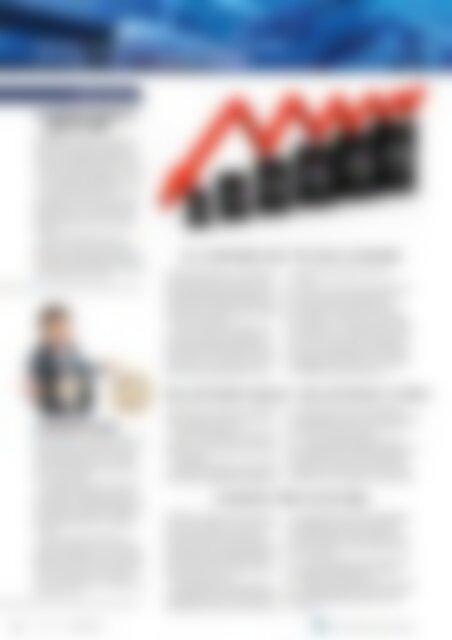201504 CM April
THE CICM JOURNAL FOR CONSUMER AND COMMERCIAL CREDIT PROFESSIONALS
THE CICM JOURNAL FOR CONSUMER AND COMMERCIAL CREDIT PROFESSIONALS
Create successful ePaper yourself
Turn your PDF publications into a flip-book with our unique Google optimized e-Paper software.
MONTHLY ROUND-UP OF THE LATEST STORIES<br />
IN GLOBAL TRADE BY ANDREA KIRKBY.<br />
NEWS IN BRIEF<br />
EMERGING MARKETS –<br />
BACK TO 1998?<br />
EMERGING markets, for a long time<br />
the main motor of global growth, have<br />
recently showed signs of stalling. But<br />
Coface says although several countries<br />
– Russia, Venezuela, Argentina – are now<br />
in crisis, there's little likelihood of a rerun<br />
of the 1998 emerging markets crash.<br />
Countries learned from that<br />
experience, and now have more robust<br />
public finances, and banks with better<br />
balance sheets - plus in many cases<br />
significantly higher reserves of foreign<br />
currency.<br />
As always, you need to do your<br />
research on whatever country you’re<br />
exporting to. But the chances of an allout<br />
crash in the emerging markets seem<br />
more limited this time round – as long as<br />
China doesn't fall out of bed.<br />
NEGATIVE YIELDS<br />
NESTLE’S Euro denominated 2016 bond<br />
recently traded at a zero yield. In fact,<br />
better than that; it traded at a negative<br />
yield of 0.002 percent. If you want to<br />
lend money to Nestle, you now have to<br />
pay for the privilege.<br />
That seems crazy. And I do wonder<br />
if the financial markets are storing up<br />
some real pain if interest rates rise. (The<br />
Swiss franc has already bankrupted the<br />
US’s largest forex trader – and that’s a<br />
far smaller market than the eurobond<br />
market.)<br />
But it does mean unless you’re<br />
running very large risks, you should be<br />
getting a good deal on your bank loans.<br />
Banks love customer inertia – they make<br />
half their money out of it. So remember<br />
to run your eye over your financing<br />
options and make sure you're getting the<br />
best rate you can.<br />
OIL COMPANIES ARE THE NEW LEHMANNS<br />
AFTER the credit crunch, it took a while<br />
until we started seeing the pain coming<br />
through from property companies. With<br />
their properties revalued downwards, many<br />
of them were in breach of their banking<br />
covenants; some rescheduled successfully,<br />
others went to the wall.<br />
We’re now seeing the results of the<br />
fall in the oil price on oil exploration and<br />
production companies. Many of them<br />
have asset-backed finance based on the<br />
value of their oil in the ground – Reserve<br />
Based Lines. As the oil price sinks, the<br />
value of those reserves falls, too - and<br />
so does the company’s borrowing<br />
ability.<br />
So far, the banks are looking supportive.<br />
EXCO has seen a 20 percent fall in its<br />
resource value, but the banks have<br />
worked around it. But if you export into<br />
the oil sector – whether you're supplying<br />
machinery and survey services, or catering<br />
and security – you need to keep on top of<br />
the news, because the risk is beginning<br />
to mount. What looked like a conservative<br />
balance sheet this time last year could be<br />
dangerously stretched by now - even for<br />
profitable, producing companies.<br />
TWO DIFFERENT INDICES, TWO DIFFERENT STORIES<br />
I'VE just taken a look at two very different<br />
charts. One is the FTSE-100 index. The<br />
other is the Baltic Dry Index.<br />
The FTSE is trading at an all time high.<br />
The Baltic, on the other hand, is at a 29<br />
year low having lost more than 60 percent<br />
in the last year.<br />
The thing that makes me worry is that<br />
the Baltic has always been a pretty good<br />
lead indicator of global trade. Maybe less<br />
CHANGING TIMES IN VIETNAM<br />
VIETNAM is changing. It’s been moving<br />
up for a while now from a low cost labour<br />
economy into higher value areas. It’s<br />
also highly export driven, with textiles,<br />
footwear, and now increasingly electronics<br />
and technology, performing strongly, and<br />
that makes it a large market for capital<br />
goods. Not bad for a country still run by a<br />
Communist government.<br />
Foreign direct investment has been<br />
fuelling the economy, with South Korea one<br />
of the biggest investors. Coface has a C<br />
assessment on the country, but that's now<br />
so these days, as higher value freight no<br />
longer goes by ship; but it still makes me feel<br />
cautious about the frothy assumption that<br />
recovery is going to continue.<br />
It's also worrying because it means<br />
shipping and port companies are seeing less<br />
and less income from their activities, and<br />
that's sure to put strain on their finances<br />
despite a bit of help from lower fuel prices.<br />
Watch out for credit quality in those sectors.<br />
on positive watch, and the credit agencies<br />
upgraded their ratings in November last<br />
year. GDP growth is five percent plus,<br />
inflation has been tamed, and the only fly<br />
in the ointment is a rather tattered looking<br />
banking sector.<br />
As well as capital goods, infrastructure,<br />
energy, and education are all potential<br />
targets for British exporters.<br />
Watch out, though: the Vietnamese dong<br />
is pegged against the dollar, but as we’ve<br />
seen with Switzerland, pegs can come<br />
unstuck.<br />
40 <strong>April</strong> 2015 www.cicm.com The recognised standard in credit management


















